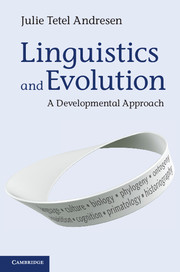Book contents
- Frontmatter
- Contents
- List of Figures
- Introduction Historiography’s contribution to theoretical linguistics
- Part I Theoretical considerations
- 1 Language → languaging
- 2 Developmental systems theory
- 3 A twist in the cognitive turn
- Part II A developmental systems linguistics
- Part III What to do next
- Bibliography
- Name index
- Subject index
1 - Language → languaging
Published online by Cambridge University Press: 05 June 2014
- Frontmatter
- Contents
- List of Figures
- Introduction Historiography’s contribution to theoretical linguistics
- Part I Theoretical considerations
- 1 Language → languaging
- 2 Developmental systems theory
- 3 A twist in the cognitive turn
- Part II A developmental systems linguistics
- Part III What to do next
- Bibliography
- Name index
- Subject index
Summary
Darwin’s Origin of the Species (1859) made an immediate impression on philologists at the time – in fact, too much of one. A scant six years after its publication, namely in 1865, the Société de Linguistique de Paris was founded and a year later formally banned in its bylaws discussion of the origin of language in its transactions and debates. The London Philological Society followed suit in 1873. The reason for the ban can be found in the words of the most influential American linguist of the nineteenth century, William Dwight Whitney, who, in the first volume of the American Philological Association, wrote:
No theme in linguistic science is more often and more voluminously treated than [the origin of language], and by scholars of every grade and tendency; nor any, it may be added, with less profitable result in proportion to the labor expended; the greater part of what is said and written upon it is mere windy talk, the assertion of subjective views which commend themselves to no mind save the one that produces them, and which are apt to be offered with a confidence, and defended with a tenacity, that are in inverse ratio to their acceptableness.
(1869: 84)Despite this caustic view of the state of evolutionary explanations, Whitney saw no need for the American association to feel bound by the French example. He declared the topic “legitimate,” even a worthy challenge since “all [the] fundamental doctrines [of linguistic philosophy] are involved in its solution” (emphasis mine). Whitney’s endorsement of the topic, however, did not win the day. The prohibitions set by the societies in Paris and London were effective, and for the next one hundred years, philologists/linguists dropped the topic and pursued other matters.
- Type
- Chapter
- Information
- Linguistics and EvolutionA Developmental Approach, pp. 11 - 39Publisher: Cambridge University PressPrint publication year: 2013

